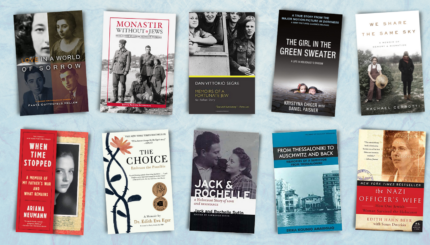In December 1946, the first session of the United Nations General Assembly adopted a resolution that made genocide a prosecutable crime under international law. Two years later they adopted the Genocide Convention, which offered a precise legal definition of genocide and outlined the mechanisms for punishing its perpetrators.
International Responses to Genocide
These developments grew out of the international community’s collective guilt about the Holocaust and were inspired, particularly, by the efforts of a Polish Jew named Raphael Lemkin. Lemkin was interested in establishing genocide codes even before World War II. He had been outraged by the absence of a legal framework under which to prosecute the Turkish perpetrators of the Armenian genocide (1915-1918). After escaping from the Nazis, Lemkin dedicated his life to establishing a legal framework for considering genocide. In fact, he coined the term “genocide” and was pivotal in ensuring the adoption of the Genocide Convention in 1948.
Lemkin’s work built on the precedent established at the Nuremberg Tribunal and laid the foundation for the ex post facto prosecution of genocide as a crime against humanity. It was hoped that the criminalization of genocide, and the denial of immunity to government officials, would be a sufficient deterrent. But the Genocide Convention failed to articulate clear criteria for preemptive action to prevent genocide or mechanisms for reactive intervention to respond to ongoing genocide.
It was not until September 2005 that the United Nations took another significant step on this matter. In its comprehensive post-plenary document, the UN adopted language committing each member state to protect its citizens from war crimes, genocide, crimes against humanity, and ethnic cleansing. It further binds the international community to “help protect populations…[by taking] collective action, in a timely and decisive manner…[should] national authorities manifestly fail to protect their populations from” these atrocities.
With your help, My Jewish Learning can provide endless opportunities for learning, connection and discovery.
Still, as the genocide in Darfur proves, living up to this mandate is no simple matter. Thus we must continue to develop moral and logistical criteria by which to consider how and when we intervene in cases of genocide, and toward this end, we must reflect on what Jewish sources can contribute to this conversation.
Jewish Responsibility: Never Again
Since the Holocaust, the Jewish community’s attitude toward preventing genocide has been summed up in the moral philosophy of “Never Again.” This phrase was originally a particularistic rallying cry among Holocaust survivors. As Abba Kovner put it: “Never again would Jewish blood be spilled unavenged.”
Over time, however, the words have come to encompass a broader commitment, among Jews and non-Jews, that genocide not be tolerated in any place at any time. In 1979, President Carter declared: “[W]e must forge an unshakable oath with all civilized people that never again will the world stand silent, never again will the world fail to act in time to prevent this terrible crime of genocide.” And in 1999, Elie Wiesel invoked the phrase to challenge the U.S. leadership’s commitment to respond to genocide perpetrated against any people: “Is today’s justified intervention in Kosovo…a lasting warning that never again will the deportation, the terrorization of children and their parents be allowed anywhere in the world?”
In this more universal form, “Never Again” can be understood as a contemporary parallel to the Biblical mandate, “You shall not oppress a stranger, for you know the feelings of the stranger, having yourselves been strangers in the land of Egypt (Exodus 23:9) .” With this often repeated phrase, the Torah codifies for Jews a notion of empathic justice–because the Israelites knew the experience of oppression in Egypt, they must not subject others to oppression.
The sentiment behind “Never Again” is essentially the same. Because the Jewish people experienced genocide firsthand and were abandoned by the international community in their time of greatest need, Jews bear a particular responsibility to ensure that genocide be prevented.
“Never Again” is a powerful moral imperative, but there are other Jewish values and laws that may compel us to protect potential victims of genocide.
Intervening to Prevent Murder
In Hilkhot Rotzeah u’Shmirat Nefesh (Laws of Murderers and the Protection of Life), Maimonides explicates our responsibility to protect others.
After delineating the appropriate punishment for a murderer, Maimonides considers the question of the rodef (pursuer): “When, however, a person is pursuing a colleague with the intention of killing him–even if the pursuer is a minor–every Jewish person is commanded to [attempt to] save the person being pursued, even if it is necessary to kill the pursuer (Hilkhot Rotzeah 1:6).” If a person is in immediate danger of losing her life at the hands of an intentional killer, Maimonides demands that bystanders stop the pursuer by any means necessary.
Maimonides does not merely require an individual to intervene personally to save a life. The responsibility extends to include the agents an individual can employ or direct: “Similarly, [this commandment applies] when a person sees a colleague drowning at sea or being attacked by robbers or a wild animal, and he can save him himself, or can hire others to save him (Hilkhot Rotzeah 1:14).” According to Maimonides, the responsibility to preemptively protect someone from death is such that one is held responsible for not doing so: “Whenever a person can save another person’s life, but he fails to do so, he transgresses a negative commandment, as [Leviticus 19:16] states: ‘Do not stand idly by the blood of your neighbor (Hilkhot Rotzeah 1:14).'”
This last source, however, raises some difficulties, as traditionally the term “neighbor” refers to Jews specifically. Can the laws of rodef be extended to non-Jews?
In fact, there are different texts of the Mishneh Torah that address this question directly. In one version, the threatened individual is identified as “ben adam m’yisrael” (i.e. a Jew); in another, the person is called “nefesh ben adam” (i.e. a human). It is beyond the scope of this article to thoroughly consider this question, but two brief sources in the Mishneh Torah suggest that Maimonides might have read the law expansively and included non-Jews in its scope. Maimonides often invokes the principle of mipnei darkhei shalom–the need to promote peace–to require Jews to visit the non-Jewish sick, provide for the non-Jewish poor, and bury the non-Jewish dead (Hilkhot Ovdei Kokhavim 10:5). There are a number of interpretations of the phrase mipnei darkhei shalom, but all of them suggest that it is incumbent on Jews to care for non-Jews in situations of grave vulnerability.
Second, in Hilkhot Sanhedrin 12:3, Maimonides invokes the principle of adam hayahid (that God originally created one human being alone) to argue that the preservation of a single human life is equivalent to saving the entire world. In doing so, he explicitly changes the language in the original mishnah (Sanhedrin 4:5) from “nefesh ahat m’yisrael” (i.e. one Jew) to “nefesh ahat min ha-olam” (i.e. one person). The implication is that, according to Maimonides, all human life is sacred and demands protection.
Of course, the laws of rodef were conceived for individuals, so extending it to peoples threatened by genocide requires an additional step. However, the spirit of these laws can serve as an important moral precedent. The obligation to save an individual from being killed should be broadened into an obligation to save a people from genocide as well. In my view, it is appropriate to cite these laws to support the deployment of peacekeeping troops in situations where genocide is taking place.
Anticipating and Protecting: Building a Parapet
At a more fundamental level, Maimonides posits an obligation to anticipate and prevent any danger which poses a threat to life. Not only are we required to intervene in a “murder in progress,” we are bound to identify threats to human life and mitigate them in advance.
Deuteronomy 22:8 states: “And you shall build a guardrail for your roof.” From this seemingly narrow and innocuous stipulation, Maimonides derives a comprehensive ethic for the preservation of human life. First, he simply broadens the guardrail requirement to cover “any place that might present a danger and cause a person to stumble and die (Hilkhot Rotzeah 11:4).”
Second, and much more ambitiously, Maimonides expands the guardrail principle in a virtually infinite manner. He writes:
“Similarly, it is a positive mitzvah to remove any obstacle that could pose a danger to life, and to be very careful regarding these matters, as [Deuteronomy 4:9] states: ‘Beware for yourself; and guard your soul.’ If a person leaves a dangerous obstacle and does not remove it, he negates the observance of a positive commandment, and violates [the negative commandment]: ‘Do not cause blood [to be spilled].'”
The implications of this principle for our political, economic, and military choices are considerable. Any support for a government or military force that engages in mass murder, or any failure to prevent those crimes from taking place, violates this fundamental commitment to the preservation of human life.
Indeed, in a world in which “comparative genocide” has become a subject worthy of academic consideration, we have obviously failed to establish a decisive moral imperative to prevent this crime against humanity. As Jews, our responsibility to act should derive both from our immediate historical experience with the Holocaust and from our millennia old commitment to the preservation of human life. It is a responsibility we cannot abdicate, otherwise, as the writer David Rieff notes, “‘Never again’ might best be defined as ‘Never again will Germans kill Jews in Europe in the 1940’s.'”
mitzvah
Pronounced: MITZ-vuh or meetz-VAH, Origin: Hebrew, commandment, also used to mean good deed.
Torah
Pronunced: TORE-uh, Origin: Hebrew, the Five Books of Moses.


